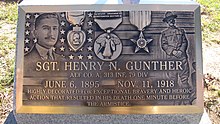Henry Nicholas Gunther
Henry Nicholas Gunther (born June 5, 1895 in Baltimore , † November 11, 1918 in Ville-devant-Chaumont , Département Meuse ) was an American soldier and the last fallen in the First World War .
Henry Gunther came from a German-American family. His parents George Gunther and Lena, b. Roth, were both children of German immigrants. He grew up in Highlandtown, a district in east Baltimore that was heavily influenced by German immigrants, where the family belonged to the Redemptorist Catholic parish Sacred Heart of Jesus . Henry Gunther was an employee of the National Bank of Baltimore . In 1915 he became a member of the Knights of Columbus . He did not volunteer for military service, but was drafted on September 30, 1917 and assigned to the 313th Regiment, nicknamed Baltimore's Ownand was part of the 57th Brigade of the 79th Infantry Division . As a sergeant he was responsible for the replenishment of his unit, which came to the front in July 1918 as part of the American Expeditionary Forces in France . A critical letter home, in which he reported the miserable conditions at the front and advised a friend to try everything to avoid being confiscated, was intercepted by the censors. Thereupon he was demoted to private in August 1918 .
The Compiègne armistice had been signed at 5 a.m. Like all Allied units on the front line of the Meuse-Argonne Offensive , his unit, A Company, was still on the way for combat operations on the morning of November 11th. They knew that the armistice would start at 11 a.m. by 10:30 a.m. and moved on anyway. The company encountered a German machine-gun nest at Chaumont-devant-Damvillers , which blocked the road and began to fire as the Americans advanced, but apparently into the air and then ceased fire. According to the report of his friend Ernest Powell, who was in command of the platoon as sergeant , Gunther jumped up at that moment and ran towards the German position. Neither a shout from Powell to stop, nor warning hand signals, nor calls from the Germans had any effect. Shortly before Gunther reached the German position in his "desperate attack" with the bayonet attached , the Germans opened fire and Gunther was shot at 10:59. His platoon leader later suspected that Gunther wanted to prove his bravery at the last minute out of the wish to be rehabilitated.
General John J. Pershing's order of the day the following day mentions him as the last American fallen in the war. Posthumously, his demotion was reversed and he was awarded the Distinguished Service Cross .
At the instigation of his now widowed mother, his remains were transferred to Baltimore in 1921 and buried in the Redemptorist Most Holy Redeemer Cemetery .
Later investigations found that on the last day of World War I, between the signing of the armistice and its entry into force, around 11,000 men were injured or killed - far more than any other day.
As the first Fallen of the First World War, the German lieutenant applies Albert Mayer , who at the August 2, 1914 Delle fell.
literature
- Joseph E. Persico: Eleventh Month, Eleventh Day, Eleventh Hour: Armistice Day, 1918: World War I and Its Violent Climax. Random House, New York 2005, ISBN 0-375-76045-8 , pp. 135.351
Web links
- Entry on Henry Gunther at Find A Grave
- World War I: Wasted Lives on Armistice Day
- The sad, senseless end of Henry Gunther
- The last soldiers to die in World War I , website of the BBC
Individual evidence
- ↑ Giles Milton: The Last Dead of World War I , Weltwoche 45.18, p. 62
- ↑ Persico (lit.), p. 135
- ↑ Persico (lit.), p. 351
| personal data | |
|---|---|
| SURNAME | Gunther, Henry Nicholas |
| ALTERNATIVE NAMES | Gunther, Henry N. |
| BRIEF DESCRIPTION | American soldier |
| DATE OF BIRTH | June 5, 1895 |
| PLACE OF BIRTH | Baltimore |
| DATE OF DEATH | November 11, 1918 |
| Place of death | Ville-devant-Chaumont, Meuse department |

